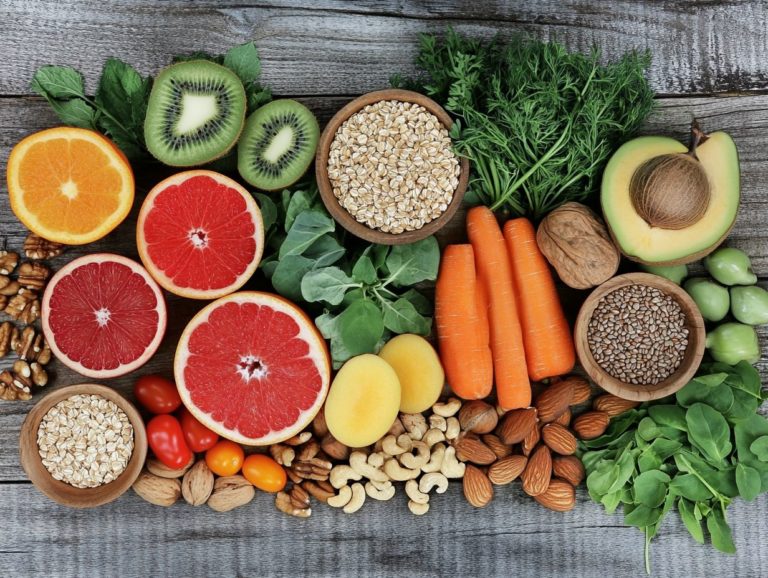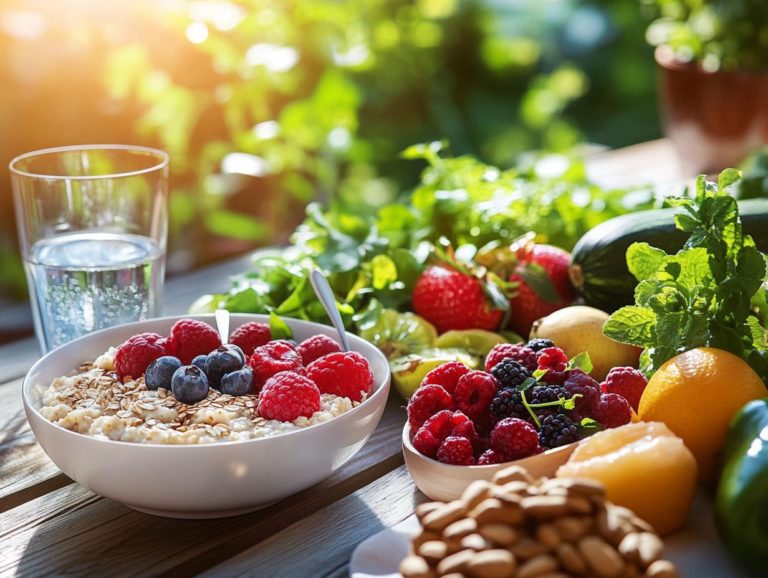The Impact of Sugar on Holistic Health
Sugar holds a multifaceted position in your body, impacting everything from your energy levels to your mood.
While it can offer a swift surge of vitality, indulging too much can lead to significant health concerns. This article delves into the different types of sugar and the adverse effects of overconsumption on both your physical and mental health. You ll find practical tips to help you reduce your intake.
You will also discover insights on healthier alternatives and a holistic approach to managing your sugar consumption, all aimed at enhancing your overall well-being.
Contents
Key Takeaways:
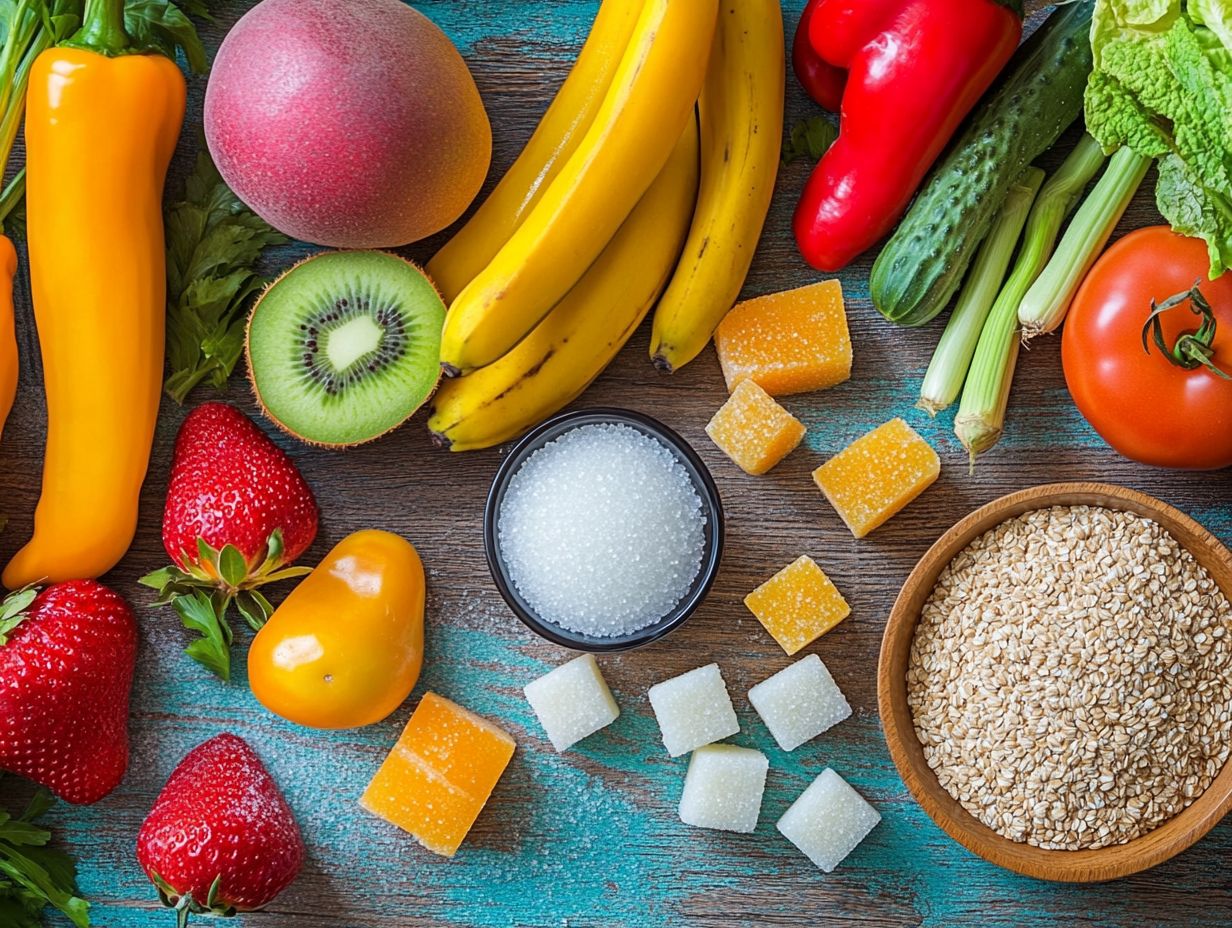
Sugar is necessary for our body, but excessive intake can have negative impacts on both physical and mental health. Reducing sugar consumption can be achieved by incorporating practical tips and opting for healthy alternatives like natural sweeteners. A holistic approach, such as mindfulness and balance, can help manage sugar intake and promote overall well-being.
The Role of Sugar in the Body
Sugar serves a crucial role in your body, primarily acting as the energy source that fuels your brain and other essential organs. This ultimately influences your overall health and well-being.
When you consume sugar, it affects your insulin levels and neurotransmitter activity, particularly dopamine, which is linked to feelings of pleasure and happiness.
However, the type and amount of sugar you consume can significantly alter your health outcomes. Added sugars and refined carbohydrates found in processed foods can pose hidden dangers to your metabolic health and dietary habits. It’s essential to consider your choices carefully.
Understanding the Different Types of Sugar
Understanding the various types of sugar is essential for making informed dietary choices. They can be divided into natural sugars, found in fruits and dairy, and added sugars, which frequently lurk in processed foods and soft drinks.
Natural sugars come with a bonus: they are typically accompanied by vitamins, fiber, and minerals that positively impact your overall health. In contrast, added sugars lack these nutrients and can lead to health problems.
Overindulging in added sugars can cause spikes in blood glucose levels and contribute to insulin resistance, where your body doesn’t use insulin effectively. This increases the risk of obesity and various health problems related to metabolism. Refined carbohydrates, often including high-fructose corn syrup, offer little nutrition and can worsen health issues by encouraging unhealthy eating habits.
By grasping these distinctions, you enable yourself to make healthier choices that promote long-term well-being.
The Negative Effects of Excessive Sugar Intake
You must recognize the health risks tied to high sugar consumption to protect your well-being! Excessive sugar intake is closely associated with a multitude of adverse health effects, such as obesity, diabetes, and cardiovascular disease.
Taking proactive steps to mitigate these risks can significantly enhance your overall well-being.
Physical Health Consequences
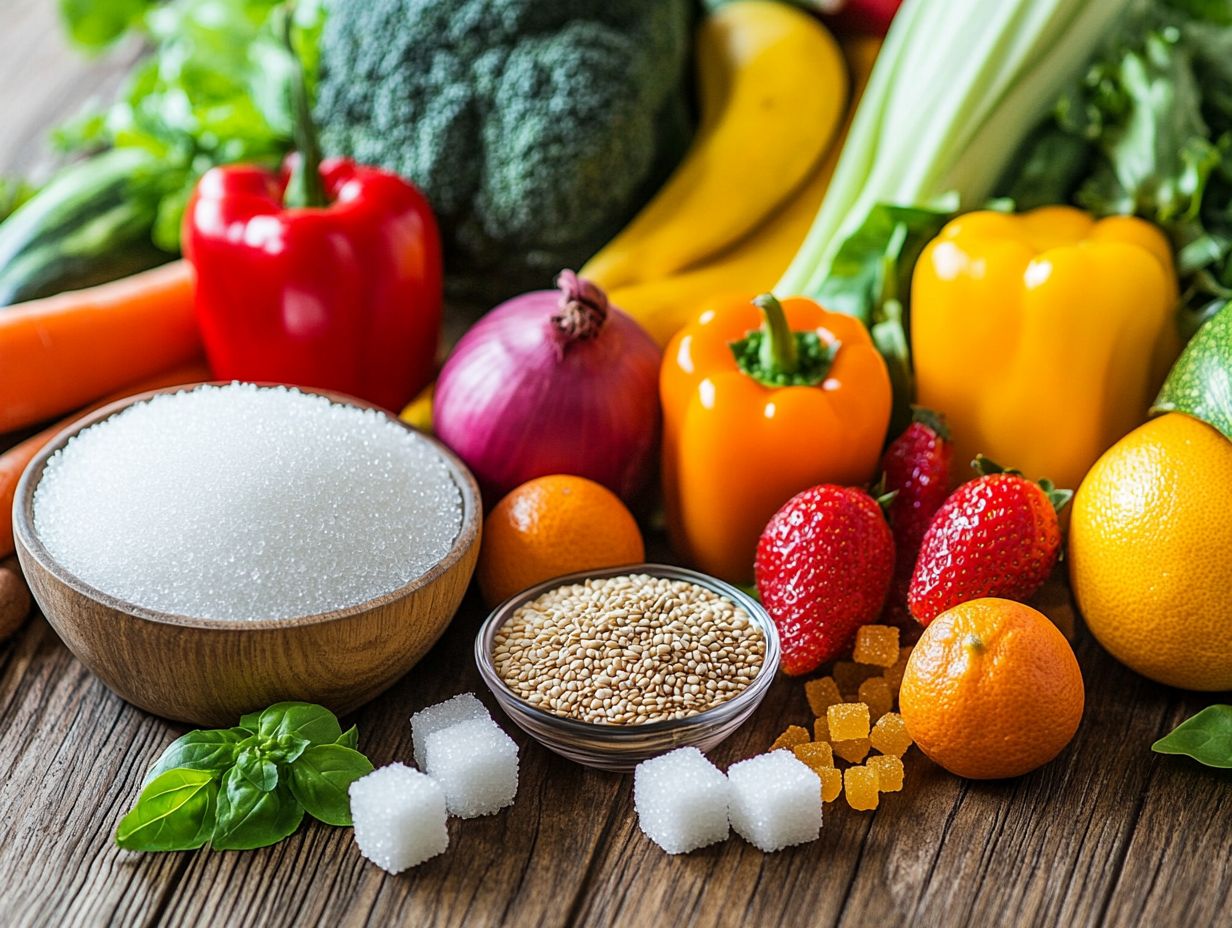
The physical health consequences of sugar consumption are serious. Excessive intake leads to obesity, type 2 diabetes, and a range of cardiovascular diseases, along with negative impacts on liver health and tooth decay.
High levels of sugar can make your body resistant to insulin, the hormone essential for regulating blood sugar levels. This resistance plays a significant role in developing type 2 diabetes.
Your liver can also become overwhelmed by fructose, a sugar commonly found in processed foods. This can lead to non-alcoholic fatty liver disease and impair its ability to function effectively.
Additionally, high sugar levels can raise triglycerides and lower good cholesterol. This significantly heightens the risk of heart disease. Over time, excessive sugar intake is linked to numerous chronic conditions, including hypertension and certain cancers.
This reality underscores the urgent need for you to thoughtfully evaluate your dietary choices.
Start your journey towards better health today by cutting back on sugar!
Mental Health Impacts
High sugar consumption can significantly impact your mental health, leading to mood swings and heightened cravings. The rapid spikes and drops in your blood sugar levels directly influence dopamine production, affecting your overall emotional well-being.
This fluctuation can create a relentless cycle, where you might find yourself reaching for sugary treats for a quick energy boost, only to experience a crash that leaves you feeling irritable and fatigued.
The intriguing relationship between sugar intake and your body s reward system showcases how these dietary choices can deliver fleeting moments of pleasure, often followed by feelings of guilt and anxiety.
Research indicates that your gut microbiome the community of bacteria in your digestive system that affects your health may also play a crucial role in emotional well-being. A diet rich in sugar can disrupt this delicate balance, potentially leading to an increase in harmful bacteria that could aggravate mood disorders.
Recognizing these connections is essential for anyone seeking to enhance their mental health.
Ways to Reduce Sugar Consumption
Reducing sugar consumption is vital for enhancing your overall health and minimizing associated risks. You can achieve this through mindful dietary choices and a keen awareness of food labels.
You can also explore healthier sugar alternatives to support your journey toward better health.
Practical Tips for Cutting Back on Sugar
Cutting back on sugar is entirely within your reach. By modifying your food preparation methods and being selective about your beverages, you can satisfy your sweet cravings without compromising your health.
Planning and prepping your meals in advance allows you to easily swap out sugary ingredients for healthier options. For instance, using ripe bananas or avocados as naturally sweet substitutes in smoothies and baked goods can work wonders.
In terms of beverages, opting for water infused with fresh fruits or herbal teas can drastically reduce your sugar intake compared to sugary sodas and flavored drinks.
Don t hesitate to experiment with sugar alternatives like stevia or monk fruit. They can provide the sweetness you desire while keeping calorie intake in check.
Implementing these strategies not only aids in weight management but also promotes better energy levels and reduces the risk of chronic diseases, paving the way for a more balanced lifestyle.
Healthy Alternatives to Sugar

Discover exciting healthy alternatives to sugar, like natural sweeteners, to indulge in delightful sweetness while fostering better health outcomes.
These alternatives not only enhance your dietary habits but also spare you from the negative effects tied to refined sugars. Embracing these options allows you to savor the sweet while prioritizing your well-being.
Natural Sweeteners and Substitutes
Natural sweeteners like honey, maple syrup, and stevia make for excellent sugar substitutes. They deliver sweetness along with added nutritional benefits that enhance your overall health.
These alternatives not only elevate the flavor of your beverages and dishes but also bring along a wealth of vitamins, antioxidants, and minerals that support better well-being.
Take honey, for example; it has antimicrobial properties and can work wonders for a sore throat. Maple syrup, on the other hand, is packed with zinc and antioxidants, boosting your immune function. And let s not forget stevia, extracted from the leaves of the Stevia rebaudiana plant it’s calorie-free and may even help keep your blood sugar levels in check.
Incorporating these natural sweeteners into your everyday meals is a breeze. Just drizzle some honey over your yogurt, swap refined sugar for maple syrup in your baking, or sweeten your morning tea with stevia. This way, you can indulge in sweetness without compromising your health.
The Holistic Approach to Managing Sugar Intake
Adopting a holistic approach to managing your sugar intake encompasses more than simply cutting back on sugar consumption. It involves embracing mindful eating practices and addressing the lifestyle factors that influence your health outcomes.
Ultimately, the goal is to prioritize the consumption of high-quality nutrients that nourish your body and promote overall well-being.
Start implementing these tips today and take control of your health!
Incorporating Mindfulness and Balance
Incorporating mindfulness and balance into your eating habits helps you build a healthier relationship with food. This approach can reduce cravings for sugar and enhance your well-being through conscious choices.
Listen to your hunger cues. This helps you tell the difference between emotional and physical hunger, so you eat when necessary.
Take the time to savor each bite. Enjoying your food lets you appreciate its flavors and leads to greater satisfaction with smaller portions.
Mindful practices increase awareness of what you eat. This helps you create a balanced diet, encouraging more healthy foods and lowering your sugar intake for long-term health benefits.
Frequently Asked Questions
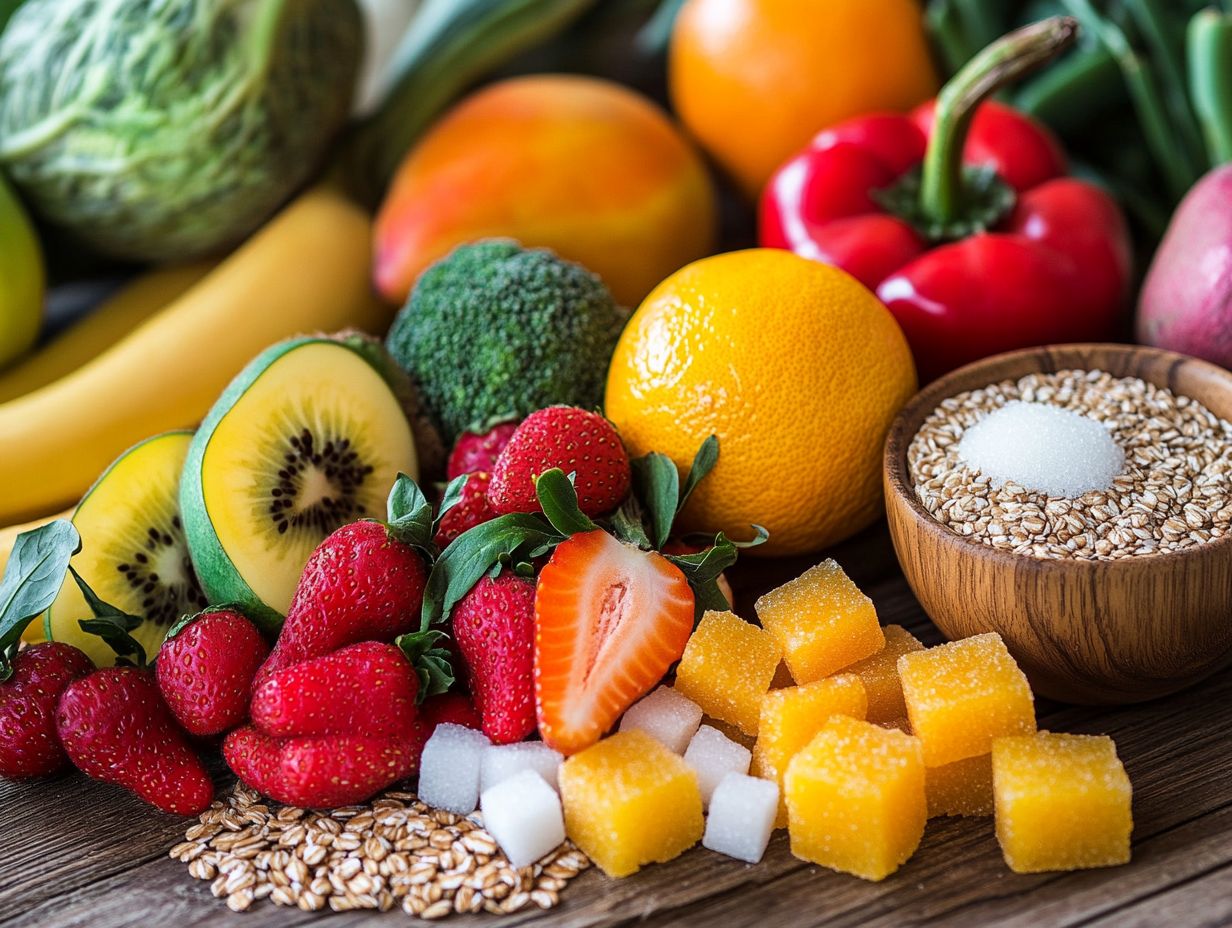
What is holistic health?
Holistic health focuses on treating the whole person, including physical, mental, emotional, and spiritual aspects. It’s about understanding how these parts connect to achieve optimal health.
What is considered sugar in terms of diet?
Sugar refers to simple carbohydrates, both natural and added. This includes sugars from fruits, milk, and table sugar, as well as sweeteners like honey and corn syrup.
Why Should You Care About Sugar’s Impact on Your Health?
Sugar can lead to negative health outcomes like obesity, diabetes, and heart disease. These issues affect your overall well-being, both physically and mentally.
What are some signs of eating too much sugar?
Common signs include weight gain, fatigue, mood swings, and frequent illness. If you notice these symptoms, consider tracking your sugar intake.
Can sugar be good for you?
While excess sugar is harmful, natural sugars in fruits and vegetables provide energy and essential nutrients. Moderation is key.
How can you cut down on sugar for better health?
Read food labels and limit highly processed foods that often contain added sugars. Choose whole foods and natural sweeteners. Also, eat more fruits, vegetables, and whole grains to satisfy cravings without sugar.

